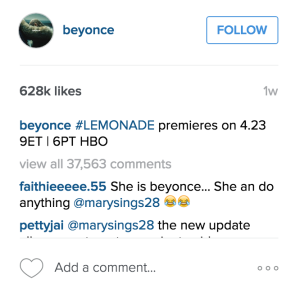Last Saturday, Beyoncé unexpectedly posted a premiere of its upcoming album “Lemonade” on Instagram several hours before the release. She had been kept this project as a secret from the public until the last minute. Her surprising announcement was like a huge bomb that detonated all social media platforms and attracted over 70k comments and one million likes merely on Instagram. Many people interpret her action as a marketing ploy, which appeals creating surprises to ignite conversations and attract public attention. Although this announcing strategy cannot take all the credit for the unprecedented buzz generated by the album, admittedly, it’s eye-catchy and full of creation.
It is not the first time that artists adopt this strategy to promote their artworks. And it’s not even the first time Beyoncé releases albums without advance notice. Back to 2013, She almost used the same way debuted her self-titled album. And After that, Drake, A$AP Rocky, Lil Wayne and Miley Cyrus followed this trend.
However, surprises don’t only happen when an artwork is released. Actually, surprise, as a natural buzz creator, has been widely utilized as a marketing tool by many companies. Thus, this kind of marketing is also called “Surprise Marketing” or “Surprise and Delight”, a process that “marketers build the value in the product or service through genuine excitement, anticipation and surprise”. Research has proved that surprise and delight is one of the most effective marketing strategies that can create long-lasting emotions and memories for individuals and further improve consumers’ brand loyalty. This method works because it appeals to human nature that people are “thrill-seekers” who enjoy being exposed to new stimuli. The stimuli can lead people to desired behaviors. In the marketing context, it means purchasing products. Surprise marketing usually appears in the form of providing surprising gifts and treats to consumers. For instance, unexpected coupons, free products or maybe fancier, free trips are all surprise marketing strategies. In this way, marketers embed long-lasting and positive emotions, experience and memories regarding the brand into consumers. And also, such strategies can certainly generate buzz and word-of-mouth at a very low cost.
The above companies’ surprise and delight marketing seems to be different with Beyoncé’s partially because Beyoncé’ s surprise focuses more on a spiritual level rather than the concrete material level. Besides, Beyoncé ’s surprise covered a wider range of people whereas companies’ unexpected rewards can only create very strong influence on people who actually receive the treats. One possible reason can be that Beyoncé, with her influence and fame can be compared to a super popular brand in the business world, maybe like Apple, whose actions can be emotive to the public. Thus, a surprising event or product release can attract enough attention. However, most brands, not too popular or too unheard, don’t have that kind of power. Thus, material encouragements seem to be a more effective and feasible way to implement surprise marketing.
No matter what size the influence scale is or how effective it is, it causes no harm to create some surprises that are much cheaper than advertising. And maybe marketers don’t even spend too much time and effort planning surprises. Just adding some mysteries to their sweepstakes strategy can be a very basic surprise marketing temptation.
References:
Sisario (2016). The value of surprise? For some artists, it’s a springboard to No. 1. Retrieved fromhttp://www.nytimes.com/2016/03/15/business/media/the-value-of-surprise-for-some-artists-its-a-springboard-to-no-1.html?_r=1
Kirst (2016). Beyonce, ‘Lemonade’ and the economy of surprise. Retrieved from http://www.forbes.com/sites/seamuskirst/2016/04/21/beyonce-lemonade-and-the-economy-of-surprise/#5b7de4ac787
Bohigian (2016). Beyoncé and the value of surprise marketing. Retrieved from http://www.socialmediatoday.com/marketing/beyonce-and-value-surprise-marketing
Why surprise and delight marketing really works. Retrieved from https://cms.entertainment.com/blog/customer-retention/why-surprise-and-delight-marketing-really-works
Hapsis (2016). Beyoncé’s LEMONADE Isn’t the First Time She’s Used Divorce to Play with Our Emotions. Retrieved from http://ww2.kqed.org/pop/2016/04/23/beyonces-lemonade-isnt-the-first-time-shes-used-divorce-to-play-with-our-emotions/
Redick (2013). Surprise is still the most powerful marketing tool. Retrieved from https://hbr.org/2013/05/surprise-is-still-the-most-powerful

